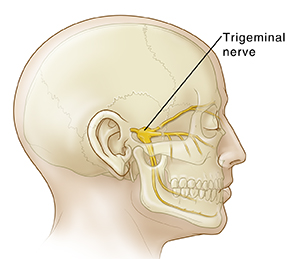You have trigeminal neuralgia. This is pain caused by irritation of the trigeminal nerve on your face. Symptoms include sudden, sharp pain in your head, face, or jaw. It may feel like an electric shock. It can last for several seconds or minutes. It often happens on only 1 side of your face. Pain may be set off by things such as moving your jaw when brushing your teeth or eating. Or by a touch on the skin of your face or cold air. The pain may be caused by something irritating the trigeminal nerve, such as a blood vessel pressing against it. But the exact cause of this problem often isn’t known. It can be very painful. But the condition isn’t dangerous. Some people have underlying health problems causing trigeminal neuralgia, such as multiple sclerosis.
Trigeminal neuralgia is often treated with medicines. These include antiseizure medicines or antidepressants. Certain other treatments may also help. In some cases, you may need surgery. For some people, radiation therapy is needed with a precise tool called gamma knife. This does not make any cuts (incisions). You may need an imaging test, such as a CT or MRI scan of the brain and skull. You will be advised if other health problems need treatment.
Home care
Your healthcare provider may prescribe medicines to help ease and prevent pain. Take all medicines as directed Please note that it may take several changes in dose and medicines before the right combination is found that controls the pain.
General care:
-
Don't do any specific activities that seem to set off the pain.
-
Keep a pain diary for several weeks. Write down when your symptoms happen and how they feel. Certain activities, such as touching your face, chewing, talking, or brushing your teeth, may bring on the pain. Cold air can also set off the pain. Make sure you write down any triggers and discuss these with your provider. This will help guide treatment.
Follow-up care
Follow up with your healthcare provider, or as advised. If you were referred to a specialist, be sure to make an appointment.
When to get medical advice
Call your healthcare provider or get medical care right away if any of these occur:
-
Fever of 100.4°F (38°C) or higher, or as advised by your provider
-
Headache with very stiff neck
-
You aren’t able to keep liquids down (repeated vomiting)
-
Extreme drowsiness or confusion
-
Dizziness or fainting
-
A new feeling of weakness or numbness or tingling in your arm, leg, or face
-
Trouble speaking or seeing


